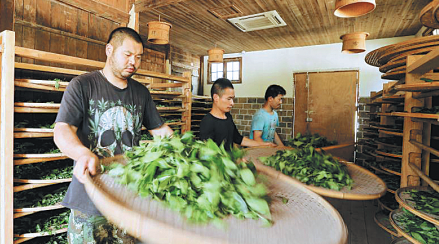 |
|
[Photo provided to China Daily] |
Around Wuyi Mountain in East China's Fujian province, April marks the beginning of tea picking season, a period that lasts more than a month and a time when visitors from all over the country come seeking what they consider to be the best tea.
The mountains where tea trees are grown provide an extra bonus for connoisseurs of the leafy infusion, as they mostly boast pristine landscape and scenery. Among the tea trees planted around Wuyi Mountain, dahongpao, is perhaps the most famous variety.
Famed for its rich, long-lasting aroma, dahongpao is a traditional tea that is made from the foliage of trees that grow in rocky gullies nearby streams and rivers.
A mild climate is a prerequisite for growing the tea trees and abundant rainfall is necessary which is how Wuyi Mountain became the best place for cultivating such "rock tea" varieties.
More than 800 kinds of tea tree have been planted in the Wuyi Mountain region and the area has become the origin of many diversified species.
Tea has become the brand and image of Nanping city, which is home to the UNESCO Natural and Cultural Heritage site where Wuyi Mountain is located. Its fame has been widely celebrated both at home and abroad.
Tea has gradually grown into to an industry that has helped boost rural revitalization plans to take advantage of the natural resources, fisheries and plantations.
Xu Weize, former mayor of Nanping, said earlier last year that its counties and villages will focus on improving tourism services.
"We are dedicated to building Wuyi Mountain into a world-class tourist destination, and there are plans in place to develop more bed-and-breakfast establishments and eateries that will help to drive up employment and income among the locals," he said.
More than 80,000 villagers are involved the tea industry, accounting for one third of the area's total population. The total value of the local tea industry has reached 2.1 billion yuan ($318.2 million).
More than a money spinner, the sought after leaf also stands out as a symbol of the tranquil, spiritual life enjoyed by many through the brewing and sipping of tea.
Such a lifestyle is considered a luxury by many urbanites and, thus, lures them back again and again, not only for the opportunity to enjoy the restorative beverage, but to get away from their hectic city lives.
It has created a boom in what has been dubbed as "slow travel".
Itineraries of such "slow travel" getaways include hiking through the lush forests - which are home to many mammal and bird species, as well as 2,200 categories of flora - along with a quintessential tea experience which starts with a visit to the plantation, and finishes with a tea tasting.
A special tea competition, which involves a number of tea experts picking the best produce of the year by examining the color of the beverage and the lasting effect of the taste, is also open to tourists.